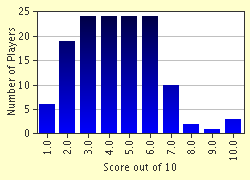Quiz Answer Key and Fun Facts
1. William Henry Harrison was born in a log cabin.
2. For what Revolutionary War hero was Harrison aide-de-camp?
3. Of the following positions, which one did Harrison NOT occupy?
4. Daniel Webster served Harrison and his successor in the White House, John Tyler, as Secretary of State. However, he wasn't Tippecanoe's first choice. Who turned down Harrison's request to take reins of the State Department?
5. During the War of 1812, which Indian leader was killed at the Battle of the Thames in 1813?
6. Harrison made a name for himself as a military commander and war hero. This, however, was not his first choice of profession. What did William originally intend to become?
7. Born in 1773, William grew up a child of the Revolution. During the war, the Harrison homestead was attacked by a unit of Hessian troops and American loyalists. Who was the commander of this band of merry men?
8. Who made the following statement about William Henry Harrison: "He has the confidence of the forces without a parallel in our History except in the case of George Washington in the revolution"?
9. Harrison spent 12 years as the Territorial Governor of Indiana. During his tenure, he was able to accomplish many goals. Which of the following was NOT one of Harrison's achievements during his time as governor?
10. Shortly after his death, William Henry Harrison's body was stolen by grave robbers and sold to a medical school for use as a cadaver for students.
Source: Author
trammgr
This quiz was reviewed by FunTrivia editor
thejazzkickazz before going online.
Any errors found in FunTrivia content are routinely corrected through our feedback system.

